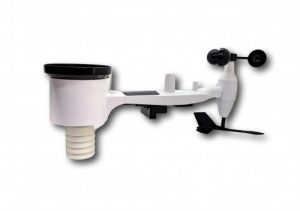Whether you are a golfer, want to learn more about climate change, or are interested in the history of the weather, a weather station is an essential tool. With these tools, you can track and forecast weather conditions. You can monitor the temperature, humidity, and precipitation without the need for radio, television, or the internet. By building your weather station, you can get accurate measurements without depending on third-party resources.
 Many weather stations come with additional sensors, such as a lightning detector, which can sense lightning up to 25 miles away. The lightning detectors can help you calculate how fast a storm is moving. In addition, a soil moisture sensor records the temperature of the soil, which is essential to irrigation decisions. A few manufacturers also include air quality sensors, measuring ozone and other pollutants. This is helpful in case of a power outage. In addition, a weather station can help you monitor the weather for your business.
Many weather stations come with additional sensors, such as a lightning detector, which can sense lightning up to 25 miles away. The lightning detectors can help you calculate how fast a storm is moving. In addition, a soil moisture sensor records the temperature of the soil, which is essential to irrigation decisions. A few manufacturers also include air quality sensors, measuring ozone and other pollutants. This is helpful in case of a power outage. In addition, a weather station can help you monitor the weather for your business.
A weather station can be a valuable educational tool. Science educators can use it to teach about the environment and climate. As an example, a weather station can help you explain the role of wind in safe takeoff and landing. A storm chaser can also use a weather station to record the movement of a hurricane. Regardless of the purpose of the weather station, it is a useful tool. You can even install a weather station on your vehicle.
A weather station has many uses. First, you can use it to decide what you want to grow in your yard. For example, knowing the temperature of the soil can protect plants from harsh conditions, while knowing the soil moisture can help you determine how much water to apply to your crops. A weather station can also help water treatment plants plan better, and it can also aid in building smart homes and business operations. If you are concerned about the weather, consider installing a personal or business weather station.
It can also be used for many different purposes. For example, it can help you in farming and gardening. If you know the temperature of the soil, you can protect your plants from harsh conditions. You can also measure the soil moisture, vital for determining the best time to water your crops. It can also be useful for water treatment plants. It can even be used for other purposes. For instance, it can be connected to smart home devices. If it is raining, it will shut down the sprinkler system, and the lights will turn on, or the temperature and humidity will be read to make the necessary adjustments.
Another common use is for agriculture. Agricultural weather stations are often placed on farms, where the data they provide can help them decide when to plant seeds. These devices can also help gardeners and farmers understand when to harvest plants while providing a more localised climate report. Using can even help improve the efficiency of a business by monitoring the weather and forecasts. And because you can easily access data online, you can share your findings with the world with the click of a button.